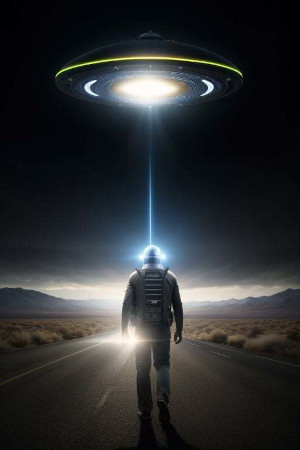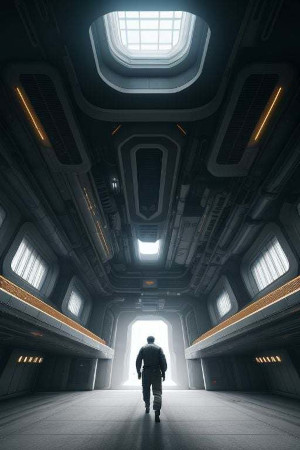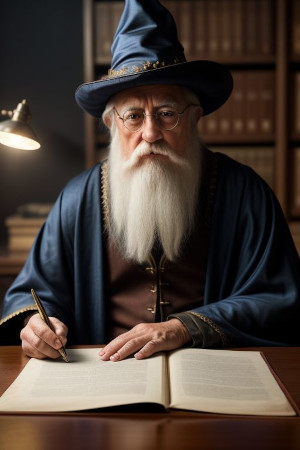2012
Dec
17
Where Do Writers Get Those Weird Ideas?
I've been asked a few times, "How do you come up with that stuff?" This is a question that undoubtedly probes the creativity of any writer, but is more applicable to science fiction and fantasy writers, who, in turn, probe the unknown.
I can understand the question. After all, I have shadows that walk around on their own and drop out burning embers if you poke them hard enough. I have two sisters who change clothes by erasing their old ones and painting new ones with something that looks like a flashlight. I have an old woman who destroys a couple of spaceships and an entire planetary installation by solving equations in her head. I have a ship that disappears but looks like a semitransparent flag if light hits it just right. I have a 12-year-old girl who started attending the university 19 years earlier. I have a man trying to catch his own murderer. (And, no, he's not a zombie! They are so trite.)
That might be some pretty weird stuff, but I'm not alone. Tolkien has a ring that controls a bunch of other rings. McKillip has a boy running around inside a wall, whose girlfriend bargained with a ghost for the return of his skull. Panshin has a society in space that every so often drops its kids off on planets to see if they live or die. Clement has a little boy with a jelly alien living inside him. That's some pretty weird stuff, too.
Please understand that I can't even begin to explain how other writers got their weird ideas, but I do have some insight as to how I got mine. I wouldn't be surprised, on the other hand, if there were some similarities, because I don't believe that different human brains work all that differently. So here goes.
Read, Read, Read; Watch, Watch, Watch
The best way to prime your mind for coming up with weird ideas is probably to expose it to other people's weird ideas. I'm  not talking about plagiarism, but I suspect that, subconsciously, we take a chip off someone else's weird idea, and a jot and a tittle from a couple of other weird ideas, and finally something never seen before pops out. No, don't freak out. This is not stealing. It has happening in literature for hundreds, probably thousands, of years, Harlan Ellison not withstanding.
not talking about plagiarism, but I suspect that, subconsciously, we take a chip off someone else's weird idea, and a jot and a tittle from a couple of other weird ideas, and finally something never seen before pops out. No, don't freak out. This is not stealing. It has happening in literature for hundreds, probably thousands, of years, Harlan Ellison not withstanding.
It's all about sparking your imagination. My imagination was pretty well sparked as a kid from reading the Tom Swift, Jr. series a few times (I still read them), and watching the original The Outer Limits (and I still watch those). The later HBO series had some good stories, but wasn't so atmospheric, and that is a lot of what sparks imagination.
Find a way to get yours sparked.
Dream
Honestly, I don't know how well this will work for everybody, but it works for me. I have narcolepsy, which is known for creating unusually vivid and coherent dreams. It is also associated with lucid dreaming, but I've never been very good at that. By coherent, I mean just that: logical, continuous, and consistent. What's more, I often dream sequels. Consider my novel, A Hierarchy of Gods. I fleshed it out a little with details, and expanded on the motivations of the bad guys, but the plot, from the moment Ritee and Nekalee encounter The Enemy at the beginning until their final confrontation at the end remains exactly as I dreamed it.
There are a few other of my works that derived either in part or almost in whole from dreams:
Large parts of The Humanity Experiment
The Invisible War: Ships of Shadow
The Invisible War: The Awaited
The Invisible War: Alternate School
Large parts of The Black Tower
Retribution
The Witches of Oberon (I'll probably change that name)
"The Fairy and the Firearm"
The Offering (from two separate dreams)
... the list goes on.
 Even if you aren't lucky enough to dream entire coherent plots, little snippets can end up evolving into something cool. It is an old standby practice for writers to keep a notepad by their bed so they can scribble down ideas before the full return of consciousness steals them away. I took a cue from The Adventures of Sharkboy and Lavagirl, and call mine a dream diary, complete with color drawings. It wasn't there one night when I needed it, however, and I had to rush to my laptop, turn it on, and outline "For the Love of Gemma." Naturally, it's weird.
Even if you aren't lucky enough to dream entire coherent plots, little snippets can end up evolving into something cool. It is an old standby practice for writers to keep a notepad by their bed so they can scribble down ideas before the full return of consciousness steals them away. I took a cue from The Adventures of Sharkboy and Lavagirl, and call mine a dream diary, complete with color drawings. It wasn't there one night when I needed it, however, and I had to rush to my laptop, turn it on, and outline "For the Love of Gemma." Naturally, it's weird.
Before departing from dreams, there is a nagging question I would like to ask of other writers. Do you have coherently plotted dreams, too? I wonder if it could be not the narcolepsy responsible — though it has been well established that the precision and vividness come from it — but that I am always plotting in my waking hours and that it comes through subconsciously in my sleep. Maybe that could be the subject for a story....
Be a Scientist
I realize that this, like coherent dreaming, isn't an option for everyone, but it works for me, more so with science fiction, naturally, than with fantasy. And by scientist, I mean in a pure research environment where your imagination is free to roam, not some stuffy corporate lab. I'm sorry, Proctor & Gamble, but trying to figure out how to maintain a shampoo's consistency while achieving a cost savings of 13 cents per liter is hardly inspiring.
Research scientists read a lot of research papers, and research papers are written by other scientists who have also done a  lot of thinking. A good paper suggests where the research can go from here, and that can lead to some fascinating ideas. Yes, nanobots have already been the subject of a lot of fiction, but did you know we have actually made nanofactories from DNA, ones that work like assembly lines, transporting in parts, assembling them, and carting the product away? Think about single-molecule Imperial Walkers. Something like them exists.
lot of thinking. A good paper suggests where the research can go from here, and that can lead to some fascinating ideas. Yes, nanobots have already been the subject of a lot of fiction, but did you know we have actually made nanofactories from DNA, ones that work like assembly lines, transporting in parts, assembling them, and carting the product away? Think about single-molecule Imperial Walkers. Something like them exists.
My particular area right now: the dynamics of bacterial siderophore iron chelation. This was motivated in part by the knowledge that we have already bred strains of bacteria that are almost immune to antibiotics and that the idea that starving them of iron is another way to fight them. I'll spare you the gory scientific and technical details, but suppose we do succeed in developing a way to block bacterial iron uptake with a gadolinium complex that binds to bacterial siderophores. (OK, I spared you most of the gory scientific details!)
Here comes the science fiction part. Suppose further that E. coli was bred 20 million years ago by a malevolent alien scientist as a detector, and when its iron intake was interrupted by a gadolinium complex it would be a signal that life on Earth had developed to the point of having enough scientific and technical knowledge for some dark purpose advanced by said alien. Suppose at that time, the E. coil mutates into something even more insidious, something that combines with human brain cells and turns people into something (no, not zombies; too overdone) else. I don't know where to go with that, but I never would have gotten the idea outside of doing this research.
I would like to say, "Never fear; you can read scientific journals without actually being a scientist." Unfortunately, most of them are behind extravagantly high pay walls and unless you have academic or corporate subscriptions, you're not going to be able to get to them. If you are rich enough a buy access, you're rich enough to pay people to read what you write, so you don't need weird ideas. There is a little-known law, however, that research paid for by public funds must be publicly accessible. It makes sense to me, but the big journal companies see it as theft of their rightful profit and are working to get that law changed. So hurry, and Google "open journals" before they disappear.
Put Unrelated Ideas Together
I recall reading a paper from an artificial intelligence journal back in the late '70s or early '80s that used this very technique to simulate machine creativity. It is a fun game that anyone can do, though it probably helps if your imagination already has some practice. For example, what can you get from a snake and a tin can? The obvious combination, of course, is canned snake, possibly a delicacy in some parts of the world; I haven't researched it. Or, suppose there is a planet populated by snakes and your idea takes place in a cannery on that world. You'd have to figure out how snakes could build the cannery and later operate it. Are they canning humans? Who knows? Or, perhaps on Earth, in the jungles of Bolivia, there is a colony of intelligent snakes that has built a city from discarded cans. Or maybe they've learned that by wrapping themselves around them and rolling, they can travel much faster than by wriggling on the ground. "Damned rollin' rattlers! Just can't keep up with them pesky critters!"
simulate machine creativity. It is a fun game that anyone can do, though it probably helps if your imagination already has some practice. For example, what can you get from a snake and a tin can? The obvious combination, of course, is canned snake, possibly a delicacy in some parts of the world; I haven't researched it. Or, suppose there is a planet populated by snakes and your idea takes place in a cannery on that world. You'd have to figure out how snakes could build the cannery and later operate it. Are they canning humans? Who knows? Or, perhaps on Earth, in the jungles of Bolivia, there is a colony of intelligent snakes that has built a city from discarded cans. Or maybe they've learned that by wrapping themselves around them and rolling, they can travel much faster than by wriggling on the ground. "Damned rollin' rattlers! Just can't keep up with them pesky critters!"
Pretty weird ideas, except maybe the canned snake. Feel free to use any of these in your own fiction; I don't intend to. I have enough unfinished stuff, already.
OK, now it's your turn. Take the snake and can, and add an ultraviolet laser.
Combine Nonsense Syllables and Make Sense of Them
Making up words can be another fun game and trigger to creativity. In fact, I've done this at times I didn't have the motivation to do anything "serious," but couldn't keep my mind from running around.
Let's make a few such words and see what they sound like.
Garkracken sounds like a monster, but that's probably because Kraken is one. Dagshinnit sounds like a panel of judges  within an esoteric priesthood. Bundlebox sounds like a magical container you keep under your bead that stores more stuff than should rightly fit, like Hermione Granger's purse. Bandershan sounds like a lost city somewhere in the Himalayas. Dyzzan Bar sounds like a picturesque but rugged and lethal mountain range separating two rival kingdoms. Rapdrickle ... Hmmm. Nothing comes to mind on that one, but I'm sure you get the point. I cranked out the word wendlefloot years ago and still don't know what it is. I could turn it into wendleflute and make it musical instrument.
within an esoteric priesthood. Bundlebox sounds like a magical container you keep under your bead that stores more stuff than should rightly fit, like Hermione Granger's purse. Bandershan sounds like a lost city somewhere in the Himalayas. Dyzzan Bar sounds like a picturesque but rugged and lethal mountain range separating two rival kingdoms. Rapdrickle ... Hmmm. Nothing comes to mind on that one, but I'm sure you get the point. I cranked out the word wendlefloot years ago and still don't know what it is. I could turn it into wendleflute and make it musical instrument.
Any of these words might sound like something entirely different to you, but that's OK. When you come across one, make a note in your dream diary about it, and the day may come when it fits into place in an elegant plot.
I could throw in something here about making up names for planets, but I think I'll save that for another post.
Find Out What There Is, and Add Something New
This game requires access to scientific information, but fortunately information generally more publicly accessible than research papers. Pick something, anything, and see what varieties there are. Then assume that they've missed something.
Take crystals. They come in cubic structures, orthorhombic, monoclinic, hexagonal, and more. There are no heptagonal crystal structures. "Yet!" you say, and that's the idea. Of course, a seven-sided crystal cell couldn't stack properly (which is why we've never seen one) but that's the intrigue. (Actually, similar structures are possible; Google quasicrystals.) Speculating on its properties is half the fun. Secret: I actually have a seven-sided crystal in my novel, The Voyage of the Sheltowee.
 People have already done extra chemical elements, undiscovered creatures, and lost cities. But how about extra quarks? Suppose there are some we've missed, that make up some very interesting matter, something like we've never seen before. Actually, I've done this, too. Other entire parallel series of fundamental particles that only interact with normal matter (even via mass) within the near-infinite energies surrounding a black hole's singularity. The idea is the basis for some of the universe and almost all the unit field technology in my science fiction series, The Saga of Banak-Zuur.
People have already done extra chemical elements, undiscovered creatures, and lost cities. But how about extra quarks? Suppose there are some we've missed, that make up some very interesting matter, something like we've never seen before. Actually, I've done this, too. Other entire parallel series of fundamental particles that only interact with normal matter (even via mass) within the near-infinite energies surrounding a black hole's singularity. The idea is the basis for some of the universe and almost all the unit field technology in my science fiction series, The Saga of Banak-Zuur.
Your turn. See what you can do with carnivorous plants.
In closing, let me point something out. Weird ideas aren't enough. Stories are not about magical rings, or space aliens needing human hosts, or dinosaurs on tropical islands. Stories are about people. All the weird ideas in the world won't do a bit of good without believable characters that the reader can identify with. The weird ideas are only the decoration.
In real closing I'll leave you with the last sentence of "The Fairy and the Firearm," which work also involves peeing on goblins, so that you can wonder what in the heck was going through my mind that day:
After all, just how many guys were there in Steuben High with a tactical nuke in his closet and a date with an elf in the morning?















Comments
There are no comments for this post.
You must be logged in to post a comment.